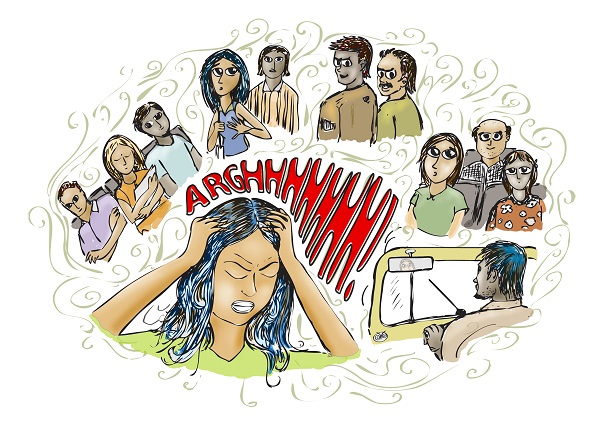The conclusion to yesterday’s ‘rape calculator’ story comes with a question to ponder on: is constant vigilance a viable option?
by Adithi Muralidhar
Part II (Read Part I)
There are a few things that run in my mind, on a daily basis 24/7. It is something that I tend to keep myself aware of, at all times. And then I think, there might be so many like me…we  have these thoughts constantly guiding our every move while we take on our daily duties, be it at work, college, home or anywhere. We make important decisions at work, we are creative, we calculate and do other math, we manage households, we are caregivers, we love, we run businesses, we teach kids, we treat patients, we sing and dance, we manage accounts and finances, we travel and study, write and act…and then we deal with male chauvinism and family matters, and all this we do when something apart from our body functions (like breathing) is continuously working inside of us.
have these thoughts constantly guiding our every move while we take on our daily duties, be it at work, college, home or anywhere. We make important decisions at work, we are creative, we calculate and do other math, we manage households, we are caregivers, we love, we run businesses, we teach kids, we treat patients, we sing and dance, we manage accounts and finances, we travel and study, write and act…and then we deal with male chauvinism and family matters, and all this we do when something apart from our body functions (like breathing) is continuously working inside of us.
All the points listed in my previous post – these are things that most girls come to learn either on their own or are taught. It, of course, very subjective and depends on the individual girl and how violated she feels if something happens to her. Some women are the kind who would probably do everything opposite to what is listed, either because they are much more brave, or just to prove a point to society that it is not her problem to tackle such issues, which is as valid a stance that can be! While others can be the non-confrontational kind; and they will go to any lengths to avoid or prevent such incidences from happening. In fact, they may do so to such an extent that it would lead to putting themselves in a permanent state of discomfort. Similar efforts are also made by women who are maybe under peer pressure and worry constantly about society and “log kya sochenge”, and tend to just go with what is considered ‘good Indian girl’ behaviour.
 And then I think of those unfortunate incidences where the terrible act of rape occurs and I cannot help but think – ‘Oh, was it because she let down her guard for one moment? Was it because for five minutes, she was carefree and forgot to do her calculations correctly, or worse, was she so preoccupied with some other ‘really important’ work, that she let the calculator’s battery run low for a while…and what a terrible consequence she had to face! Imagine, carrying that weight around your head the whole time.’ What does a mother go through? She not only has that calculator set for herself, but she also has it set for her daughter(s). Every time she says – “Yes, you can go to the party, but be careful. Yes, but please be back home by midnight. Yes, but please get dropped home by a guy. Call me when you reach there…” she is doing all those calculations in her mind.
And then I think of those unfortunate incidences where the terrible act of rape occurs and I cannot help but think – ‘Oh, was it because she let down her guard for one moment? Was it because for five minutes, she was carefree and forgot to do her calculations correctly, or worse, was she so preoccupied with some other ‘really important’ work, that she let the calculator’s battery run low for a while…and what a terrible consequence she had to face! Imagine, carrying that weight around your head the whole time.’ What does a mother go through? She not only has that calculator set for herself, but she also has it set for her daughter(s). Every time she says – “Yes, you can go to the party, but be careful. Yes, but please be back home by midnight. Yes, but please get dropped home by a guy. Call me when you reach there…” she is doing all those calculations in her mind.
Why does a woman even have to be worried about these things in the first place? Isn’t it enough that they already have to deal with other kinds of inequalities and oppression in society? The worse thing is that most people think, ‘What can you do, this is how it is. This is normal.’
Well, it is not. No one deserves to live a life like this. Constant vigilance can drive a person insane. Previously, the scientific community viewed vigilance as something that is mentally undemanding. But recent studies in psychology tell us otherwise.
“… physiological and subjective reports confirm that vigilance tasks reduce task engagement and increase distress and that these changes rise with increased task difficulty”.
(Warm, Parasuraman & Matthews, 2008, p. 433)
The authors of the above paper of course extend their conclusion to occupations that involved being constantly vigilant, like being involved in military surveillance, air traffic  control, cockpit monitoring, seaboard navigation, quality control, long-distance driving, and agricultural inspection tasks, etc. But having to constantly worry about what you do requires a high amount of energy, even though it seems that women have been and are doing this effortlessly (and unfortunately, innately) for ages.
control, cockpit monitoring, seaboard navigation, quality control, long-distance driving, and agricultural inspection tasks, etc. But having to constantly worry about what you do requires a high amount of energy, even though it seems that women have been and are doing this effortlessly (and unfortunately, innately) for ages.
Also, many psychologists are of the opinion that the impact of chronic stressors are usually ignored and are in reality much more insidious than even the extreme (non-chronic) stress symptoms. There have been studies on gender differences in stress and many studies report that women have been found to have more chronic stress than men. In fact, there are studies that even explore gender specific stressors for women – like violence, sexist discrimination, etc. – all of which can be detrimental to their physical and mental health.
Coming back to the real question – why should we even be doing this? I have to admit that it would be idealistic to think that I can keep my guard down in today’s society (be it in Mumbai, or be it any town in India or even in the world). Personally, I am not willing to take the risk. So what would I prefer? Keeping all those antennae alive and ticking seems like the only option right now. Is it okay? No. It is not OKAY. I just have my hopes set on the fact that education and more awareness among people will help to change the society for better and such crimes against women would eventually stop one day.
Till then, my calculator beeps on.
Adithi Muralidhar currently works in the field of science education research, in Mumbai. Apart from that, she works in areas related to environment and sustainability and also has a keen interest in social issues.
(Pictures courtesy www.mumbaimirror.com, www.indiatvnews.com. Sketch courtesy Manoj Nair. Adithi has referenced ‘Matud, M.P. (2004). Gender differences in stress and coping styles. Personality and Individual Differences Vol 37(7), pp 1401–1415’ and ‘Warm, J.S., Parasuraman, R., and Matthews, G. (2008). Vigilance Requires Hard Mental Work and Is Stressful. Human Factors, Vol. 50, No. 3, June 2008, pp. 433–441’ for the writing of this story)
